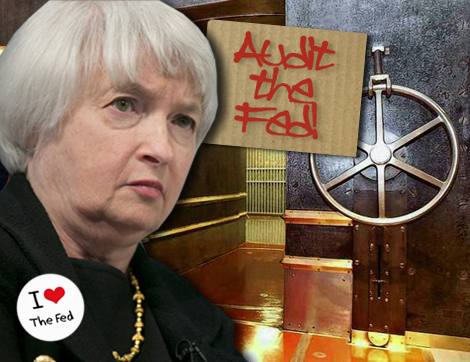
• Janet Yellen bristles when asked about audit of Federal Reserve
By Mark Anderson
When Janet Louise Yellen appeared before the House Financial Services Committee February 11, she gave relaxed answers to most questions. But two members of Congress that day touched a nerve when they each grilled the newly confirmed chairman of the privately owned and controlled Federal Reserve on the merits of former Texas maverick Representative Ron Paul’s bill to audit the Fed.
Mrs. Yellen was also scheduled to address the Senate Banking Committee February 13 as part of her twice yearly report to Congress, but it was postponed.
At the House hearing, Representative Bill Posey (R-Fla.) and Representative Michele Bachmann (R-Minn.) not only pressed Mrs. Yellen on what she’d think of Paul’s bill if it were operational, they also touched on monetary policy—the Holy Grail of Fed operations.
Mrs. Yellen’s demeanor noticeably changed when that sore spot was exposed. She made it clear that in no manner whatsoever would the Fed ever allow an in-depth government audit to “second guess” the sacred monetary policy conducted behind closed doors by the Fed’s Open Market Committee (FOMC).
That committee publishes minutes and a basic schedule, but even presidents and Congress members cannot attend FOMC’s meetings. The Fed calls that “independence,” which it certainly is. But critics say that deciding how much money enters the economy, and under what terms, is a critical piece of the Fed’s actions that needs to be much better understood and closely watched, not hidden.
Posey called Paul’s audit bill “the most-sponsored bipartisan bill” that’s been put before the House in recent memory. It passed the House with flying colors in mid-2012 but was blocked in the Senate. Paul’s son, Senator Rand Paul (R-Ky.), reintroduced it in the current Congress as S. 209. A similar bill is parked in committee on the House side.
An unavoidable question is that if Bachmann and Posey think an audit is so important, then why don’t we see more action on these ready-to-go audit bills?
When Mrs. Yellen indicated that she finds it hard to believe Congress may not fully trust the Federal Reserve, Posey shot back: “Some of us believe in the adage ‘trust but verify.’”
He told Mrs. Yellen that federal agencies are subjected to government audits that the Fed somehow avoids, apart from sundry audits conducted by private accounting firms. Why not the Fed?
Posey stressed to Mrs. Yellen that Paul’s audit bill limits itself to “post-decision audits.” That means that individual Fed actions, including those taken by the FOMC, would not be second-guessed. Posey thought that condition would cure Mrs. Yellen’s jitters about elected officials looking over the Fed’s shoulder when it devises and implements monetary policy.
He was mistaken.
While Mrs. Yellen made a throw-away remark that perhaps the Government Accountability Office could visit the Fed and read its meeting transcripts, she kept returning to the same-old Fed boilerplate that “political” intervention (read: public input or real accountability) is not welcome at the Federal Reserve.
“An audit is different than second-guessing policy judgments,” she stated with a faint hint of contempt.
As if reading a script, Mrs. Yellen repeated that the Fed’s assigned duty is to “maximize sustainable employment and price stability.” She added: “[Keeping] inflation running well below 2% is our objective.”
Mrs. Bachmann, who also pressed Mrs. Yellen about her view of an audit, stressed that there is growing public criticism of the Fed. She asked how struggling Americans could ever hope to have any control over their often gloomy economic destinies if the Fed insists that a real public audit is unacceptable.
Mrs. Yellen only replied that committee hearings like this one were pretty much all Americans and Congress could ever hope to have in terms of influencing or in any way trying to steer the Fed.
Among other things, Mrs. Yellen said the Fed has plans to carry out “proposed rulemaking” to address highly risky ventures engaged in by banks. This was in response to a question on why most banks engage in elaborate investments without providing a practical benefit to the productive sector. She added that the Fed would cooperate with the Securities and Exchange Commission, which she feels has more authority in this respect.
She also declared the dollar is stable and will always be the world’s reserve currency. But she made that statement while largely avoiding the question of what the Fed would do if the dollar loses its reserve status amid nations increasingly trading with other currencies.
She casually dodged the statement by Representative Brad Sherman (D-Calif.) that “we need Jimmy Stewart banking back in the U.S.” He was referring to the community-friendly banker played by Stewart in “It’s a Wonderful Life.”
Sherman is concerned that the Fed is too tolerant of banks that only loan to large interests and deny loans to small business owners.

